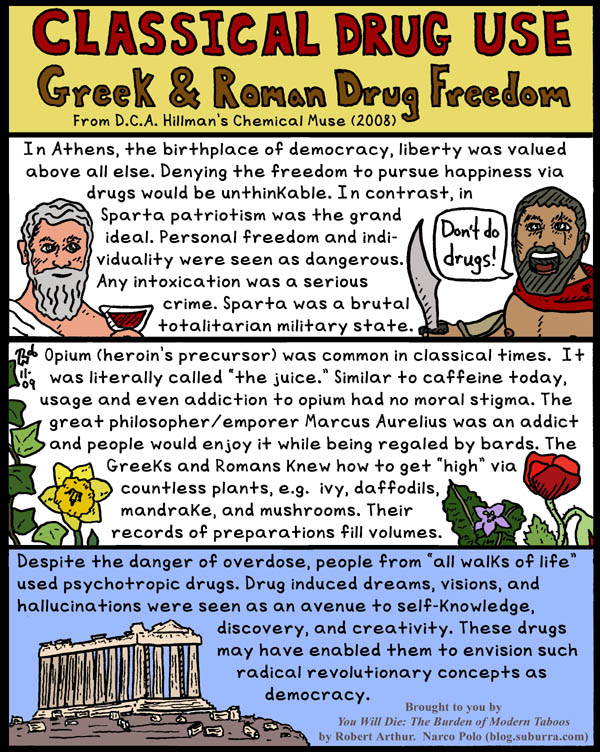Classical Drug Use: Greek and Roman Drug Freedom
Posted: November 16th, 2009 | Filed under: alcohol, drugs, hallucinogens, heroin, history, legalization, mushrooms, opiates | 12 Comments »
As Dr. David Hillman writes in his book, The Chemical Muse (2008):
The Greeks and Romans used opium, anticholinergics, and numerous botanical toxins to induce states of mental euphoria, create hallucinations, and alter their own consciousness; this is an indisputable fact. (p. 87)
This fact has been intentionally ignored and covered up by historians. (See previous post.) Recreational drugs have been translated out of classical literature in the same manner as bawdy sexual references were until recent decades.
This has occurred with individual words. Opium has been translated into poppy seeds even where it makes no sense. But it has also occurred with entire concepts.
Drugs, Sex, Magic
Classical literature abounds with sorcerers, magicians, and witches. Translators rarely reveal that their power stemmed from their great expertise in drugs. Sorcerers were classical drug dealers and the effects of drugs were seen as magical in those times. Drugs and magic were one.
Medea, the wife of Jason the Argonaut, is frequently portrayed as a witch. She aided Jason by putting fire-breathing bulls asleep and giving him amazing courage. Hillman shows how translators mistranslate polypharmakon and pharmaka to present her as being skilled in the “magical arts” and a possessor of “charms.” Medea was actually “drug-savvy” and possessed “drugs.” She gave the bulls and Jason drugs, not spells.
Sorcerers were honored and respected members of society. They and the more run-of-the-mill drug sellers, “root cutters,” had to know how to extract desired chemicals from plants and animals. This was an exact science for the wrong amount or the wrong extraction could kill. For example, mandrake in minute doses could generate euphoria and stimulate libido, at low doses it was an anesthetic, and at regular doses it was lethal.
Symposia and Spiked Wine
The Greeks and Romans favored method of drug administration was to mix them with wine. This has allowed history teachers to present ancient revelers as merely drinkers – not “illegal drug” users. As the scholar, Dr. Carl A.P. Ruck has written:
Ancient wine, like the wine of most early peoples, did not contain alcohol as its sole inebrient but was ordinarily a variable infusion of herbal toxins in a vinous liquid. Unguents, spices, and herbs, all with recognized psychotropic properties, could be added to the wine. (pp. 176-177)
This gives an entirely different purview of the Greek symposia. At these “riotous drinking parties” great minds like Socrates and Plato debated and developed their theories on the great philosophical questions. Another clue tells even more. Altered states of consciousness were viewed as divinely provided madness. Plato wrote:
But he who without divine madness comes to the doors of the Muses, confident that he will be a good poet by art, meets with no success, and the poetry of the sane man vanishes into nothingness before that of the inspired madmen. (p. 177)
To learn about the academic censorship of this scholarship read, “The Ph.D. Candidate Who Said Too Much: A Drug History Whitewash.”
Source:
D.C.A. Hillman, The Chemical Muse: Drug Use and the Roots of Western Civilization (2008). LINK


